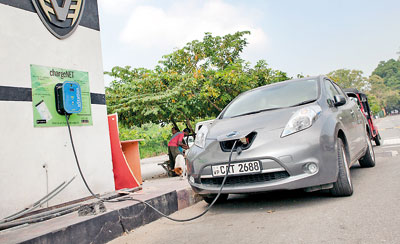News
Concern over VAT addition on some consumer items
View(s):Concern has been expressed over the re-imposition of a 15 percent Value Added Tax (VAT) on selected items including fabrics, spectacles and electronic goods — but a reduction in prices of some essential items has brought relief to the people.

The Electric Vehicle Club president said the electric car market had not benefited much from the budget Pic by Sameera Weerasekera
An optical company spokesperson said that from April 1, there would be an increase in the prices of lenses, contact lenses, sunglasses and frames.
He said an ordinary pair of spectacles now being sold at Rs. 3,500 would be increased by about Rs. 500. He said most people above the age of 40 were now using spectacles and the increase would affect both the user and the industry. He also warned that many low quality lenses were being smuggled into the country and the price increase might lead some people to opt for low quality products, thereby further weakening their eye sight.
Watch importer Mohomed Riham said the re-imposition of VAT on watches would have an impact mainly on luxury brands. There would not be a significant increase in the prices of non-luxury watches. Electric item importers also fear a drop in their sales due to the reimposition of VAT from next year.
Meanwhile, the Lanka Private Bus Owners’ Association president said they were unhappy over the decision to reduce the tax on small cars. The association’s President Gamunu Wijerathne said this would increase traffic congestion on roads and people would be less inclined to use public transport.
“We are against the decision to impose a carbon tax on passenger buses without taking steps to curtail the heavy traffic congestion in the country. I think the government should ban the importation of vehicles for at least a year as the country has exceeded its capacity,” he said.
The Electric Vehicle Club’s president Mahisanka Abeywickrama said the electric car market had not benefited much from the budget as the prices would be still high for the middle class. He noted that the tax for a Nissan Leaf would still be more than Rs.2.7 million. “The tax concession given to brand new electric vehicles should be extended to vehicles with a 30,000km mileage or for vehicles that are two-years old.”
Ornamental plant industry officials also expressed concerns over Budget proposals. Plant nursery owner A.A.K. Perera said the tax concessions given for growing plants and the production of plant seeds should have been extended.
The budget also proposed a 15 percent increase in the fees charged for the services provided by some state agencies. The fees have not been revised for the past 3 years.
The fees for first registration of vehicles, registration of new owner, annual revenue licence which have not been changed since 2013 are likely to be increased next year.
The expected revenue from the revision of fees is likely to be about Rs.7,500 million.
However the fees to obtain the National IdentityCard through the one-day service and the passport fee are not expected to change. They were revised in 2015 and last year.
Meanwhile, a meat importer welcomed the reduction in the duty on imported meat saying it would benefit the tourism industry. He said there would be around 10 percent price reduction in the imported meat. He believed that high quality meat could also be imported with the tax removal.
The Budget also announced a number of other steps to promote tourism. The measures include the setting up of lifeguard stations and tax revisions to facilitate sports tourism.
While some traders feared price increases and decline in sales because of the Budget proposals, many consumers expressed relief over the reduction in prices.
In Pettah, big onion retail prices drastically dropped to Rs.136 from Rs.200 while at Sathosa outlets the price was reduced from Rs.167 to Rs.118. At these outlets, the potato price was reduced from Rs.125 to Rs.110 a kilo and dhal from Rs.155 to Rs.134.
In super markets too the prices have dropped. Big onion prices have been reduced from Rs.218 to Rs.158 a kilo and potatoes from Rs.155 reduced to Rs.118 a kilo.

